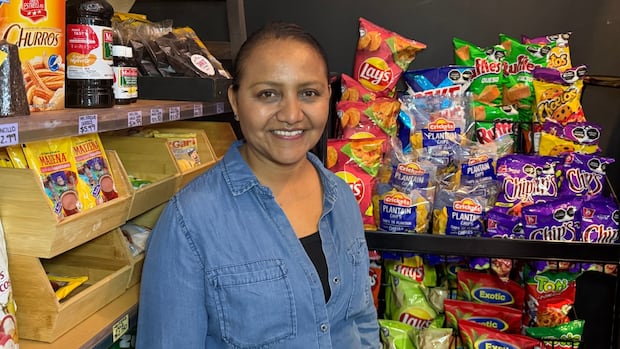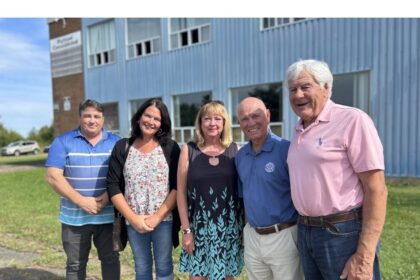British ColumbiaThe owner of San’s Latin Market says it’s more than a place to buy goods and send money transfers. It’s a place to build community.Migrant workers make up the bulk of agricultural labourers in CanadaSandra Zahuna, the owner of San’s Latin Market, says her store is a place where temporary foreign workers can find community. (Jacqueline Gelineau CBC)Each year, when temperatures begin to spike, Kelowna residents look for signs that the summer’s harvest will be fruitful — mounds of peaches at roadside fruit stands, the sagging branches of cherry trees, the number of tractors chugging down back roads, and the long line outside of a small Latin market.In 2013, Sandra Zahuna opened San’s Latin Market, now a bustling money transfer service and community store, 10 years after moving to the Okanagan from Mexico to work on one of the first farms in the region to employ temporary foreign workers. For the thousands who power the Okanagan’s fruit harvest each year, Zahuna’s market is more than a store — it’s a gathering place and a lifeline. As Canada’s agricultural sector faces chronic labour shortages, migrant workers have become essential to the region’s economy, yet they often remain invisible to the communities they sustain.San’s Latin Market offers not only familiar goods and financial services, but also a rare sense of belonging.In 2024, a cold snap killed stone fruit buds, resulting in a meagre harvest and a notable decrease in the number of migrant workers that were brought to the Okanagan, said Zahuna.This year, her store is full of people working long hours to harvest cherries, peaches and apples. “Many of them, they feel like they’re not as important as they are,” Zahuna said. “I think they are a very important part of the food system in Canada. I think that they should be more visible.”Robyn Bunn of RAMA Okanagan said approximately 8,000 temporary foreign workers come to the region each year. (Sandra Zahuna/Submitted)Canadian agriculture needs migrant labourThe federal government has created programs that allow companies to hire temporary foreign workers when Canadians and permanent residents aren’t available.Despite a national workforce of 70,000 temporary foreign workers in 2022, more than 28,000 agricultural labour positions still went unfilled that year.The Canadian Agricultural Human Resource Council estimated that in 2022, the lack of labour resulted in $3.5 billion in losses to the industry.”We don’t have an agricultural industry without migrant workers. It doesn’t exist,” said Robyn Bunn, a founding member of RAMA Okanagan, an advocacy group for migrant workers.She said approximately 8,000 temporary foreign workers come to the Okanagan each year, with more than 17,000 working on farms across the province. “The industry itself has fought for these programs to bring people in because there’s not enough Canadians who are willing to do this work … [Migrant workers] are so central that we would not have this [agricultural] industry if we didn’t bring in temporary foreign workers to do these jobs,” said Bunn.From small beginnings …Zahuna said when she first moved to Canada, there were comparatively few migrant workers in the fields across the Okanagan. On the fruit farm, she worked as an interpreter and co-ordinator, helping migrant workers navigate health care, finances and anything else they needed. Through the farm, she began importing tortillas for the seasonal staff. Before long, word spread through fields across the Okanagan. “It started like more people asking me for tortillas or other Mexican products. And [that] is how I [realized] that it was a need, that I need to start something,” said Zahuna amid the bustle of her busy shop. She then started operating a mobile money transfer and tortilla delivery service, driving to meet farm workers in remote fields across the Okanagan Valley. Before long, the volume of requests became too much, and Zahuna had to consolidate. She would meet workers in centralized locations to bring them goods and help them send funds to their families back home.”I used to come here once a week, and they wait for me…. But the word spread, so then more people wait for me.”Zahuna remembers arriving at rural parking lots to find huge lines.”I was like, Oh my God, I cannot continue doing this. We need a place and [that is] how we [started] here… We’ve been here in this location since then.”Migrant workers who work on fruit farms use the money transfer service at San’s Latin Market to send funds home to their families. (Jacqueline Gelineau/CBC)More than a storeZahuna said she wanted San’s Latin Market to be more than a place to buy goods and send money transfers. “I also wanted to make a place where they can feel that they are important, not just for the harvest and the hard work … A place where they belong, where they can find their products that they like, that they feel like home.”Now, during harvest season, there is often a long line of workers waiting to use the market’s money transfer service and buy familiar products.Even when the line is out the door, Zahuna said she and her staff take the time to speak with customers to see how they are doing and if they need any support. “They leave everything they have. They leave family. They leave their culture behind. They have their language. So they left everything back home, and then they give everything for us, and then we should recognize and respect that.”There is often a long line of people at San’s Latin Market in Kelowna, which has become a hub for migrant workers in the Okanagan. (Sandra Zahuna/ Submitted)Bunn said many temporary foreign workers in the Okanagan live on the remote farms where they work. Distant work locations and long hours mean migrant workers are typically only able to leave on occasional days off, she said, which can be isolating. “They also face a lot of racism when they come into the community as well,” said Bunn.She said that makes a welcoming space like San’s Latin Market particularly important.”They gravitate toward those places where they know that they will feel like they belong. There’s not enough welcoming places in the Okanagan where workers feel they can go and feel safe and feel comfortable and be themselves.”ABOUT THE AUTHORJacqueline Gelineau is a CBC journalist based in Salmon Arm. She can be reached at jacqueline.gelineau@cbc.ca.
‘They give everything for us’: Temporary foreign workers find community at Kelowna, B.C., market











